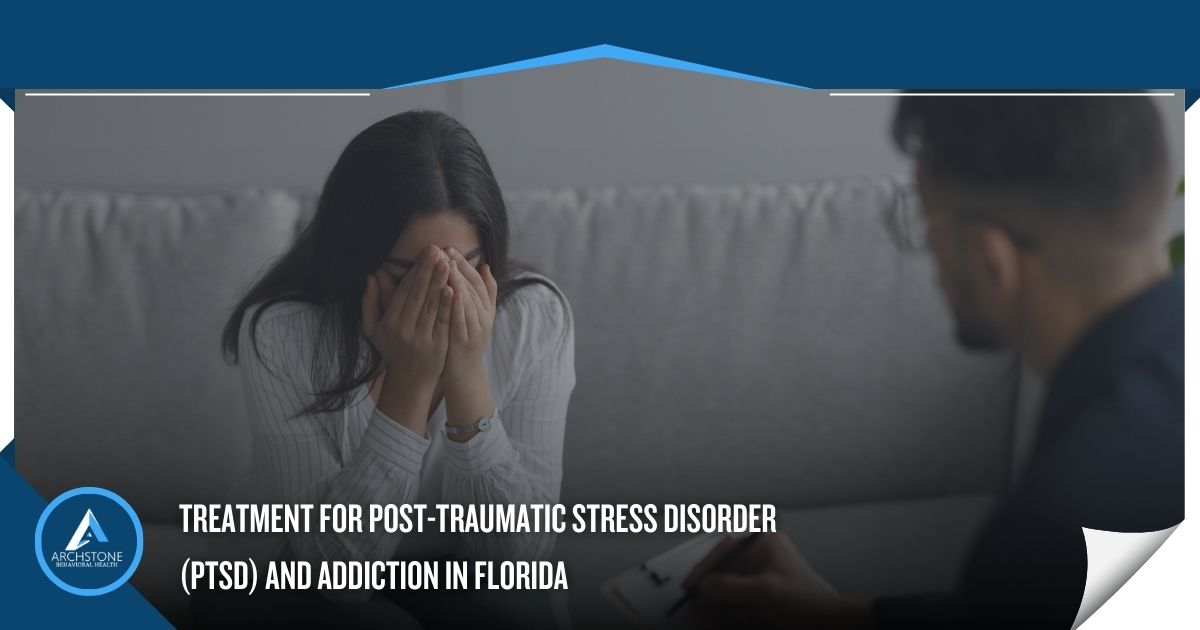Treatment for Post-Traumatic Stress Disorder (PTSD) and Addiction in Florida
Get Help Now
Addiction is a chronic and progressive disease that affects millions of Americans each year. According to the Substance Abuse and Mental Health Services Administration (SAMHSA), 48.7 million people suffered from addiction in 2022.
While substance use disorders have a wide variety of causes and risk factors, mental health plays a huge role. Many people begin abusing drugs and alcohol to self-medicate symptoms of underlying mental health conditions. Even though any mental illness can co-occur with addiction, post-traumatic stress disorder (PTSD) is one of the most common.
Post-traumatic stress disorder is a mental health condition that stems from untreated traumatic events. People might experience PTSD symptoms like flashbacks, nightmares, intrusive thoughts, and severe mood swings. Unfortunately, they might turn to drugs and alcohol to numb these symptoms temporarily.
If you struggle with co-occurring PTSD and addiction, speak with our team at Archstone Behavioral Health to learn about our Florida treatment programs.
How is PTSD Connected to Addiction?
Post-traumatic stress disorder causes significant stress in a person’s life. This mental health disorder causes a wide range of symptoms, from flashbacks and insomnia to mood swings and social isolation. When you combine these symptoms, it’s easy to see how difficult it can be to cope with PTSD.
Unfortunately, people with PTSD might begin using drugs or alcohol to cope with their symptoms. Studies show that individuals with PTSD are 2 to 4 times more likely to suffer from addiction than the general population.
If you are suffering from PTSD and addiction to drugs or alcohol, it’s time to consider your treatment options. An addiction and PTSD treatment center can help you regain control over your life through a combination of various group therapies, medications, and relapse prevention skills.
How are Co-Occurring PTSD and Addiction Treated in Florida?
When you have a co-occurring mental health issue like PTSD, it needs to be treated at the same time as your addiction. Thankfully, dual diagnosis rehab in Florida does just that. At programs like Archstone Behavioral Health, you can receive a combination of mental health and addiction treatment services.
During treatment for PTSD and addiction in Florida, you can expect:
Medical Detox
The first step in recovering from addiction is medical detox. Before you can even begin to address your PTSD, you have to rid your body of drugs and alcohol. While the thought of experiencing withdrawal can be scary, medical detox ensures your symptoms remain at a minimum.
During medical detox, you will be prescribed medication to control withdrawal symptoms and prevent cravings. Additionally, medical staff will monitor your vital signs to ensure you remain in good health throughout the process.
Therapy and Counseling
Therapy is vital to the recovery from both PTSD and addiction. Addiction and mental health treatment programs use evidence-based therapies. In other words, the types of therapies you engage in are proven effective for both addiction and PTSD.
One of the most common therapies used to treat PTSD and addiction is cognitive behavioral therapy (CBT). This type of therapy relies on addressing and correcting negative patterns of behavior while teaching you positive coping mechanisms.
Other therapies used to treat PTSD may include:
- Eye Movement Desensitization and Reprocessing (EMDR)
- Cognitive Processing Therapy (CPT)
- Mindfulness-Based Stress Reduction (MBSR)
- Acceptance and Commitment Therapy (ACT)
- Exposure Therapy
- Art, yoga, and Tai Chi
- Biofeedback and Neurofeedback
It is important to note that you will participate in both individual therapy and group counseling. Additionally, many dual diagnosis rehab centers bring your family members in to engage in family behavior therapy.
Medications
While PTSD can be managed through therapy, some people need medications to help them cope with symptoms like depression, anxiety, and even mood swings. If your doctor believes you would benefit from medication, there is no need to worry about becoming dependent on it. Only non-habit-forming medications are used to treat PTSD during dual-diagnosis treatment.
Examples of medications used to treat PTSD include:
- Zoloft (sertraline)
- Paxil (paroxetine)
- Effexor (venlafaxine)
Relapse Prevention and Aftercare
Lastly, people recovering from addiction are at risk of relapsing. Your risk becomes even higher when you are transitioning back into daily life after completing a treatment program. Thankfully, dual diagnosis rehab centers help you create a relapse prevention plan to ensure you maintain your sobriety.
Relapse prevention often includes identifying possible triggers, having a list of coping mechanisms to use, and staying active in a recovery community. Rehab programs will also offer aftercare services to ensure you receive the support you need.
Examples of aftercare services include:
- Continued therapy
- Medication management
- Referrals to outpatient rehab or sober living
- Recommendations on local support groups to attend
- Alumni support group
- Case management services like legal and vocational assistance
Get Connected to PTSD and Addiction Treatment in Florida
If you or a loved one suffers from co-occurring PTSD and addiction, it’s time to seek help. Dual diagnosis programs can offer you the tools and support you need to regain control over your life. With individualized therapy, medications, and relapse prevention planning, you can achieve long-lasting recovery.
At Archstone Behavioral Health, we believe in providing compassionate, evidence-based, and individualized care. Contact us today to learn more about our PTSD and addiction treatment center in Florida.
